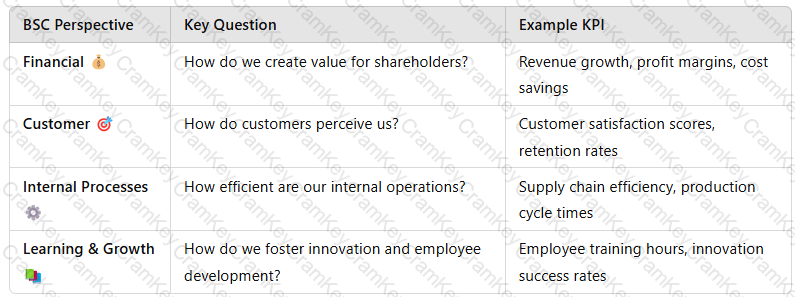Importance of Measuring Performance & Performance Measurement Tool
Introduction
Performance measurement is essential for organizations to evaluate theirefficiency, effectiveness, and strategic success. It providesquantifiable insightsinto business operations, helping companies makedata-driven decisions, improve productivity, and maintain competitive advantage.
To achieve this, organizations usevarious performance measurement tools. One widely used tool is theBalanced Scorecard (BSC), which provides aholistic approachto measuring performance across different business areas.
1. Importance of Measuring Performance
Organizations must measure performance to achieve the following benefits:
1.1 Supports Strategic Decision-Making
✅Helps businessesalign operationswith strategic goals.✅Identifiesareas needing improvement or investment.
????Example:A company analyzing supply chain delays can makeinformed decisionson sourcing alternative suppliers.
1.2 Improves Efficiency and Productivity
✅Tracksoperational effectivenessto reduce waste and costs.✅Ensures departments meetKPIs (Key Performance Indicators).
????Example:Amanufacturer measuring production efficiencycan identifybottlenecks and streamline processes.
1.3 Enhances Customer Satisfaction and Quality Control
✅Monitoring performance ensureshigh product/service quality.✅Helps companies respond tocustomer expectations and feedback.
????Example:A retail company trackingcustomer complaint resolution timescan improve customer service.
1.4 Ensures Financial Stability and Profitability
✅Measuresprofit margins, cost efficiency, and revenue growth.✅Assists inbudgeting and financial planning.
????Example:A business monitoringcash flow and profitability ratioscan detect financial risks early.
1.5 Supports Continuous Improvement and Benchmarking
✅Allows companies tocompare their performance with competitors.✅Encourages aculture of continuous improvement.
????Example:A company benchmarkingits sustainability metricsagainst industry leaders canenhance CSR strategies.
2. Performance Measurement Tool – The Balanced Scorecard (BSC)
One widely used performance measurement tool is theBalanced Scorecard (BSC).
2.1 Explanation of the Balanced Scorecard
TheBalanced Scorecard (BSC), developed byKaplan and Norton, measures performance acrossfour key perspectives:
 A screenshot of a computer
Description automatically generated
A screenshot of a computer
Description automatically generated
2.2 Application of BSC in Performance Measurement
✅Holistic View:Measuresfinancial and non-financialperformance.✅Strategic Alignment:Ensuresall departments contribute to business goals.✅Data-Driven Decision-Making:Provides insights forprocess improvements and competitive positioning.
????Example:Alogistics companyimplementing BSC could track:
Financial:Cost per delivery
Customer:Delivery accuracy and satisfaction scores
Internal Processes:Warehouse efficiency
Learning & Growth:Employee training on automation tools
3. Advantages and Limitations of the Balanced Scorecard
✅Advantages✔Aligns performance measurement withbusiness strategy.✔Ensuresbalanced focusacross financial and operational areas.✔Encouragescontinuous improvementthrough KPI tracking.
❌Limitations✖Can becomplex and time-consumingto implement.✖Needsregular updatesto remain relevant.✖May requirecultural changefor adoption across all departments.
Conclusion
Measuring performance is essential forstrategic decision-making, operational efficiency, customer satisfaction, financial stability, and continuous improvement. TheBalanced Scorecard (BSC)is apowerful toolthat provides acomprehensive performance assessment, helping organizations maintain asustainable competitive advantage.